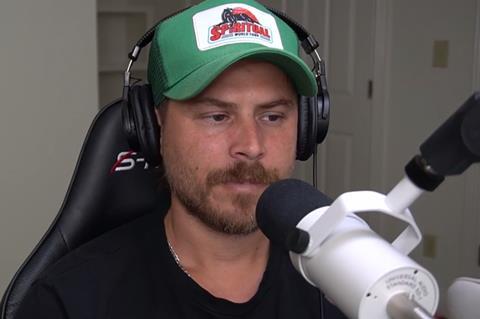Can anything good come from offending someone on the internet? Yes, says singer songwriter Cory Asbury. And he should know

The ‘Reckless Love’ writer Cory Asbury is no stranger to criticism.
He recently sat down with me for a long conversation about the state of Contemporary Christian Music, his outspoken approach to social media and why he had decided to take a break from the internet. You can hear that conversation now on The Profile podcast.
Yet shortly after that interview was conducted, Asbury was back online, and back at the centre of controversy. This time for a parody video which appeared to mock another Christian artist. Forrest Frank had recorded a song from his hospital bed after breaking his back in a skateboarding accident. Frank’s testimony of his miraculous recovery had gone viral online, inspiring a slew of takeoffs. Asbury’s “dicey” take was to also write a song of praise from his hospital bed, only the context was him recovering from a vasectomy (the lyrics included, “Snip, snip season but we stay winning souls / Spread the gospel not my seed”). Many took offence over the episode – including Frank.
Yet the story had a happy ending. Asbury was quick to apologise and Frank was quick to receive it. From the ashes of potential misunderstanding, a genuine friendship has emerged. Unlike much of the discourse that takes place on the internet, here were two Christian men modelling grace, repentance and normal, human relationships – with all their mistakes and imperfections.
Now, they’re set to release a song together. Recorded separately in response to one another’s social media posts, it is called ‘Misunderstood’. The pair are hoping that it will go as viral as their previous beef – and spread a better message of reconciliation and restoration in a world sorely lacking in either.
So Cory, tell us what has happened since last time we spoke?
A lot! The last time we talked, I was like: “Yeah, I’m not going to touch the internet”, which is hilarious. I shut everything down for almost three weeks. And it was super peaceful. It was what my heart and soul needed.
We had a bunch of videos recorded already, so my team was like: “Why don’t we just roll those out. You don’t have to touch it; you don’t have to look at it.” And I was like: “Sure. As long as I don’t have to be looking at it, I’m not having to monitor it”, that’s fine.
And then I kept getting texts like: “Hey, bro, have you seen all the Forrest stuff?” And I was like: “Dude, I heard! That’s crazy!” Then Crowder broke his leg, and then all these people were parodying it. Someone sent me Matthew West’s video about a bee sting on my finger…
I’m a glutton for punishment, so I was like: “This is too fun not to jump on”, because I love just bringing lightheartedness to that space. So, I told my team: “I got this idea. I’m gonna write this song, and then y’all come over, we’ll record the video.”
I knew that it was edgy. To me, the content’s not that big of a deal - talking about a vasectomy is not unholy. People get very up in arms about that kind of stuff, like: “How could you talk about God and also a vasectomy?” Well, he created our reproductive system. This is not new to him. So, I knew it was a little dicey for sure. It’s going to be polarising. But I’m always OK riding that line, because if someone’s going to be that messenger, I’ll be that messenger, to push prudish Christians who say: “You can’t say blah blah blah…” like that Pharisaical, religious spirit that’s so afraid of everything. I like pushing boundaries and making people think.
We posted [the video] and that night, my son had a football game in Memphis. I got home at 1am, checked my phone and it had a million views already. Then I looked at the comments. So many of the comments were, essentially, poking fun at Forrest – saying his healing wasn’t real, or this and that. I’m sitting there going: That is not what I meant when I put this video up. It was a lighthearted thing. I was just messing around.
I know Forrest. He came to my show two years ago and we hung out. I texted him and I was like: “Bro, these comments are not cool with me. They’re not what I meant at all. My apologies, bro. If this is bothering you, please let me know, and I will take it down in a heartbeat.”
The next morning, he texted me back: “Dude, thank you so much for reaching out, it means the world genuinely. It did genuinely hurt my feelings. Number one, it felt like it made light of what my family went through. It was a legitimate thing with my back, and I didn’t know if I was gonna be OK. Number two, it felt like people were piling on because of your video.”
I was like: “Bro, I’m taking it down. No worries.” That was the start of all of this. It was an interesting time, but I gained a brother through it. We’ve been talking for hours each day, about how we reframe public discourse on social media.
When he posted his response, I knew it was coming because we were in communication. But the comments were insane, and just brutal. I had just posted a song about my dad dying, and someone commented on that video: “He sure didn’t do a good job raising you. Shame on you. You call yourself a Christian?” With a bunch of clown faces.
That’s another level of vitriol and hatred. Just because Forrest expressed his hurt, all of a sudden people feel they have license to come over to my page and go: “Hey, you’re such a piece of garbage.” Just because you don’t like something that someone’s done on the internet, it doesn’t mean you have to flame them with hate language. It’s OK to just scroll past it. Maybe people don’t know that, but it is.
The whole thing is interesting though, because their hatred fuels the algorithm. So eventually, when we release a song, that snowball effect - where people are hating and arguing - will actually push the song further and hopefully accomplish more via the message and values in the song, which is basically: “Hey, if you feel misunderstood, that’s OK. Jesus was misunderstood. They nailed him to a tree. All you got to do is call up your brother or sister or go to their house and say: ‘Hey, man, I feel hurt by this’”.
That’s the way we’re supposed to work things out. But in our current day and age, we don’t often do that.
In the response video you posted after Forrest’s comments, you opened up about your childhood and said that you often use levity and humour as a coping mechanism. Can you explain that?
My mum was an intensely devout follower of Jesus. But for my dad, the Jesus thing didn’t really take effect until quite recently. He was an intense man, screaming, yelling, cussing, freaking out, throwing stuff, breaking stuff. He never hit us, but he was extremely verbally abusive. It started with my mum, and then as I got older, he would shift that anger and rage to me.
So for me, it was all just escapism. You’re trying to avoid those feelings and thoughts. A lot of it was drugs and alcohol and girls, but I also used humour to lighten the load. If everything’s funny and light, you don’t have to face the reality of what you’re actually experiencing. It’s why people love comedies.
I don’t think I would naturally be as intense as I am, if not for my experiences at home. It caused me to be more prickly. I think some people are naturally like that, but for some people, there are things in their life that caused them to be that way. They would naturally prefer not to, but something took place along the way where you’re like: “Nah, I’m taking this head on. We’re going to do this.”
Is that why you continue to push the envelope sometimes on social media, even though you know it might cause you grief?
For sure. Your teenage years are probably your most formative. So, when I’m running up against an attitude that’s super strong, I have to rise above that with even more strength. That has definitely made me, for better or worse, the man that I am today.
I’ve gotten so much healing and breakthrough. My dad and I have wept together. He’s apologised. I’ve apologised. There’s been so much restoration. But when you’re facing that? For me, it was just like: “Oh, you want to talk to me like that? You want to try to control me? Nah, we’re not doing that.” It made me a really strong, really rebellious, throw-off-all-restraint sort of human - even after I was saved, and even after I was married. It was always: “You can’t make me do anything. You can’t control me.”
This Forrest thing brought up a lot of really good stuff in my heart, because I knew that in order to fulfil the narrative that we were trying to speak to the world, I would have to be the bad guy. I would essentially have to be the villain in this story. I would have to lose. I would have to humble myself and apologise. And when I was young, I would not lose, no matter what.
If I got taken advantage of, it was a reflection of my weakness. It was a reflection of my dad, when I was 13 years old, yelling at me: “You’re pathetic” when I couldn’t chop wood. I’m reminded of that picture every time I ‘lose’, every time I’m not the one who’s on top in a situation. It was always a mirror, reflecting back at me: you’re still that weak little kid.
I had to get so much healing from that and learn that it’s OK to lose. It does not define me. It’s OK to be humble. It’s OK to get taken advantage of. If someone steals money from me, it’s not a reflection of my character. I’ve had to really sit with that. You look at Jesus on the cross. Bro was looking pretty weak, you know? When he’s in the tomb, he looked pretty stupid. That moment of loss is really difficult to metabolise. But I’m not that loss. We are sons of God. That defines who we are.
Do you regret posting the video?
I don’t think I regret much in life, because it all works for good. If I don’t post that video, then Forrest and I don’t grow to be friends. This song doesn’t come out. People don’t see a healthy public discourse on social media. The kid getting bullied at school doesn’t have a picture of forgiveness from Forrest
I’m not the good guy in the story. Forrest was the one who was gentle and humble and went: “Hey man, that hurt.” He wasn’t like: “You piece of garbage. Cory.” From that place, I was able to say: “Bro, I’m so sorry. I apologise. That was not cool.”
In his video, Forrest expressed a sense of not always understanding the motivation behind some of your social media content. Has it made you reflect at all on the content you put out?
It’s definitely a reflection and a helpful self-awareness tool. We’ve talked about it at length.
What I really appreciate is Forrest’s wide-eyed wonder, his sort-of puppy dog approach to Christianity and miracles and healing. Some people would say: “Oh well, he’s new in the faith and he’s younger. Cory is a salty dog, and he’s been through the wringer” - and I believe there’s truth to that.
But here’s the thing: we’ve been having Bible study at our house on Tuesday nights, with a bunch of people who just got saved. They’re just a bunch of ragamuffins and misfits who don’t really fit the mould, but who want to follow Jesus. We’ve been going through the first four chapters of Matthew, and five or six supernatural things take place. Mary gets impregnated by the Holy Spirit. Joseph gets visited by an angel in a dream. The Magi see in the stars that Jesus has been born. Then God gives the Magi a dream and tells them not to go back to Herod. So many things take place in four chapters. At the end of it, I was like: “Dang! I have forgotten the wonder of the supernatural!”
I think there’s something so special about that wide-eyed wonder. My wife told me: “I think we need to repent for that salty dog mentality.” God can break in in any moment. He can give a dream or a vision. He can heal a back, a leg – even a vasectomy! He can do anything. So I’m definitely convicted. Father, give me eyes to see what you’re doing and believe for all the stuff that you can do and not get frustrated with the world and the Church and be jaded.
I think Forrest carries that in a really special way.





































2 Readers' comments